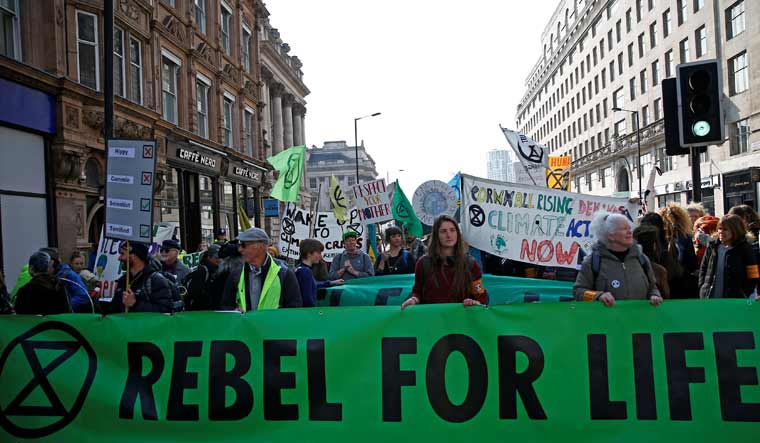Central London came to a standstill on April 15 as thousands of climate protestors flocked in the name of Extinction Rebellion. Extinction Rebellion, a protest movement that is bringing attention to global climate change, resurfaced on Monday and the protests are expected to go on for at least a week.
Protesters thronged the Waterloo bridge, one among the five locations targeted for demonstrations, with trees, plants and solar panels and barricaded it. The so-called “rebellion” is not confined to just London but is expected to gain global attention with 88 cities across 33 countries taking part in the campaign.
The movement has its origin in the United Kingdom. It was founded on October 31, 2018 with the motto “Fight for life; Rebel for life.”
The most significant demand the movement raises is for governments to take up policies to cut down carbon emission to zero by 2025. In addition, they also demand the reduction of excess of other greenhouses gases.
READ: Naked protesters interrupt Brexit debate in the House of Commons
Ironically, the Extinction Rebellion, which had from the time of its inception claimed itself to be a socio-politico movement that uses non-violent means to “avert climate breakdown, halt bio-diversity loss, and minimise the risk of human extinction and ecological collapse”, has taken up violence and vandalising as its last resort.
According to international media reports, almost 10,000 people worldwide have signed up as “willing to get arrested” in the name of the rebellion. And over 80 per cent claimed that they were “willing to go to prison”.
Extinction Rebellion activists have said that nothing has come off of 30 years of regular environmental campaign. This has promoted them to take up the method of willingly getting arrested to gain the government’s attention.
 Demonstrators protest on Waterloo Bridge during an Extinction Rebellion protest on April 15 | Reuters
Demonstrators protest on Waterloo Bridge during an Extinction Rebellion protest on April 15 | Reuters
Hundreds of activists took to the streets, disrupting traffic, and some even went to the extent of breaking glass doors of offices situated in Waterloo. climate protesters have caused around GBP 6,000 worth of damage at the Shell headquarters in London.
One of the major drawbacks of Extinction Rebellion as James Butler in his article The Climate Crisis Demands More Than Blockading Roads, Extinction Rebellion in The Guardian says is the movement’s unwillingness to formulate targeted policy demands and lack of a political strategy. Such a policy formulation is not an easy task as climate change is a global issue and hence involves not just national legislatures but international organisations as well.
Extinction Rebellion has three core demands―for the government to tell the truth about climate change; bring carbon emissions down to zero; and a democratic assembly to oversee the process. However, the group does not propose a way on how the demands can be met. The ends are defined, but with no means to reach the ends.
While it is true that barricading roads, vandalising buildings and willingly getting arrested have gained the campaign international attention it expected to gain, the question remains―Will these bring about the desired outcomes Extinction Rebellion seeks?
Climate change is inevitable at this point. Scientists have discovered that even with all the greenhouse gases emission cut down to zero, climate change cannot be stopped. The policies aimed at controlling will take several decades to make the impact it promises. Given this, the possible solution to escalating climate change must be us, humans finding new ways to adapt to the changing situation. If environmental activists and protesters realise this, rather than protesting and blockading, they can devote their time and energy in formulating new ways of adapting to the inevitable changes.



